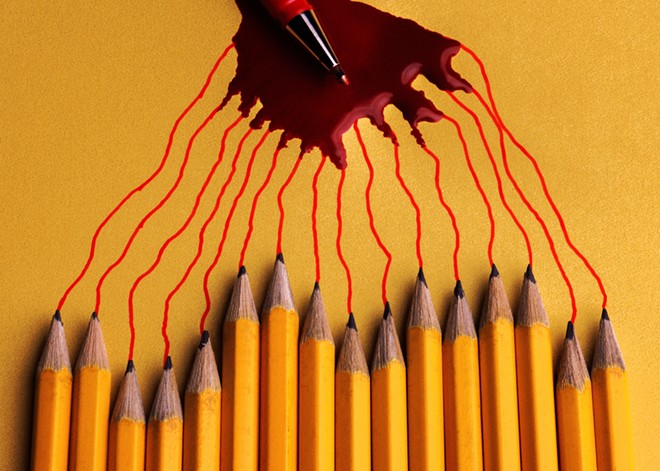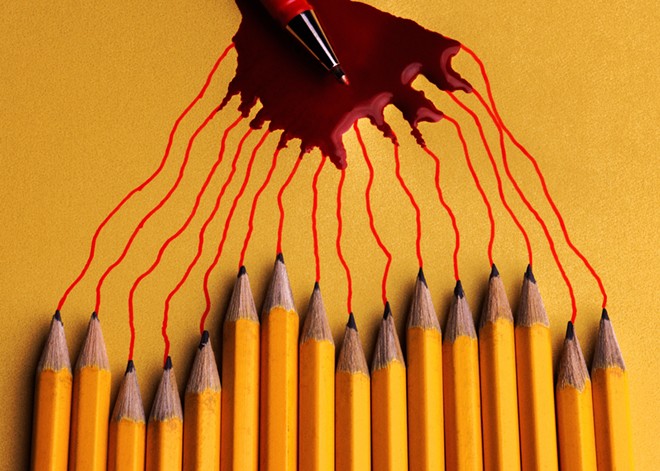The other day I opened my inbox to find a request from an old friend, Eastern Washington University. More specifically it was the Creative Writing Program, of which I am a proud degree holder, attempting to save itself from further annihilation. Their ask wasn”t for money, but for data.
“Once again EWU is doing a top-to-bottom analysis of every program-related cost and every imaginable return on those costs, and looking for ways to shrink or cut programs,” the email read. “If you don’t mind, if you could please share with us your current position title and employer, and how your MFA prepared you for this work (or didn’t), we would really appreciate it.”
This message went out to an undisclosed recipient list of alumni, presumably hoping a favorable number of responses of respectable job titles and legitimate employers might bolster the program’s value in our community.
I don’t have a job or an employer, so I was left to my only remaining options: begging and pleading. Since my time at EWU, I had moved on from where I worked to start a production company of my own, which has succeeded in keeping bills paid, as well as telling the story of our city through short films, commercials, music videos, photographs and art exhibits.
Currently this includes recording a musical album, and a few of my photographs of local artist Harold Balazs are being included as part of an upcoming show at the MAC (see page 16). I am honored that those images are hanging alongside the works of one of Spokane’s most prolific and brilliant artists, but neither of these would have been possible without the insights and lessons I learned from the writing program and community of writers and artists it connected me with. Though it’s not easily measurable, the experience and skills gained through the writing program have made me a better communicator and given me the most important skill I possess — curiosity.
The ability to see beyond the job-acquisition pipeline that our schools are increasingly obsessed with is the “outside the box thinking” that our business counterparts are always asking for in new employees. This is a regular acknowledgment that the ability to think creatively is valuable to other career fields though often difficult to foster within those fields alone. This ability to imagine beyond the boundaries of best practices and verified results is fostered in the Arts. Removing them from the curriculum shorts the goal of the entire education system.
I’ll admit I hadn’t read it before, but Eastern’s vision statement claims they are “the public university whose students, faculty, staff and alumni make profound and significant contributions to the economic and social vitality of the region.” Certainly social contributions are not as easy to measure as economic ones, but it means we must consider them in ways other than in the terms we measure economic contributions.
It’s no secret that students are struggling at all levels of their formal education. While trying to keep up and comprehend test-based learning, most are trying to understand their purpose and who they are. Without access to the Arts, which allow us to witness and process complex emotions, many go their lives without understanding the depths of their experience and self.
I, like many, would have dismissed such emotional arguments in the past. It wasn’t until I began writing that I could understand parts of my life and what they had meant for me. This realization — gained through the Arts — has become central to my work, but also immeasurably important to me personally and as a member of our community.
This is different for every person, but of those who are given the chance to experience or learn about the Arts, many gain understanding, success, and influence around their other chosen field(s) as they are able to explore their passions and work creatively. To put it another way, this arts degree has given me more clarity and ability than is measurable.
My partner, Ellen, and I both have art degrees from EWU and have been able to create a life with consistent work that allows us to live well as creative professionals and artists in this city. It may not be the story you’ve heard about art degrees, but it’s a testament to the strength of the creative writing and fine arts programs at Eastern.
Unfortunately, my particular degree in “Non-Fiction Creative Writing” no longer exists, a casualty of the last top-to-bottom analysis. Ellen’s program will soon be gone if the current recommendations of Eastern’s Strategic Resource Allocation Academic Task Force are followed. I understand that most higher education is struggling with these same decisions, but with every new strike of the pen, it seems the focus of the university has continued to pivot away from the Arts and toward programs with a measurable return on investment.
“A city cannot rest on its creations from a half-century ago, it must live and breathe with new thought and new art.”
tweet this
We may not all be able to show the direct economic value of our education, wherever it comes from. This is not necessarily a weak point of arts programs, it is the point. The Arts are interwoven with the health of our society. All of them — music, writing, film, dance, performance art, photography, ceramics, watercolor, poetry, painting, time-based-art, printmaking, drawing, videography, sound design, jewelry making, woodwork, comics, acting, animation, etcetera — give us deeper understandings of who we are and how we are connected beyond class, gender, or culture.
The artists who live among us give our city so much of its character, its entertainment, and its meaning. This is the spirit of a place, and it cannot be borrowed or replicated from elsewhere, it must come from within. A city cannot rest on its creations from a half-century ago, it must live and breathe with new thought and new art. Education not only gives us the creators with the conviction to explain who we are, but also a thoughtful community that can better understand what we have made together.
Balazs recognized Spokane’s spirit to “transcend the bullshit,” birthing a philosophy that has persevered as a multitude of slogans have come and gone. I believe it’s because those words are not marketing but gospel, and have come to the aid of many artists and creative people as they struggle to make and communicate in times of change. It is in their beautiful and complex creations where we may look to find who we are.
The responsibility of education, especially from our public institutions, is to give us the tools to know ourselves, and to help us understand who we might become individually and together. More than any other time in my life are the most immeasurable and important parts of our education in peril of being extinguished by the holders of the keys. I only hope they understand what they wield. ♦
Rajah Bose is a local photographer, artist and writer.


